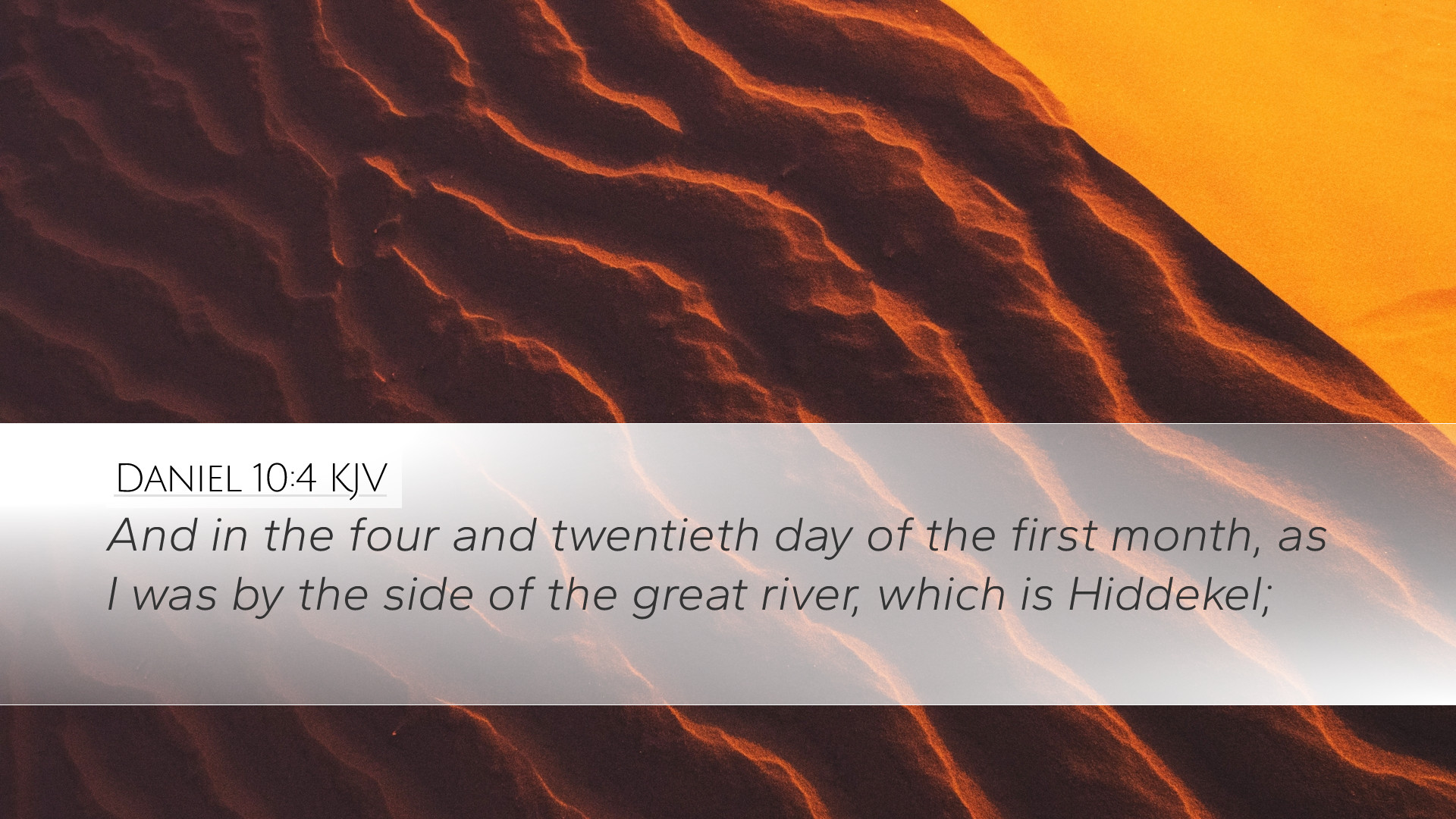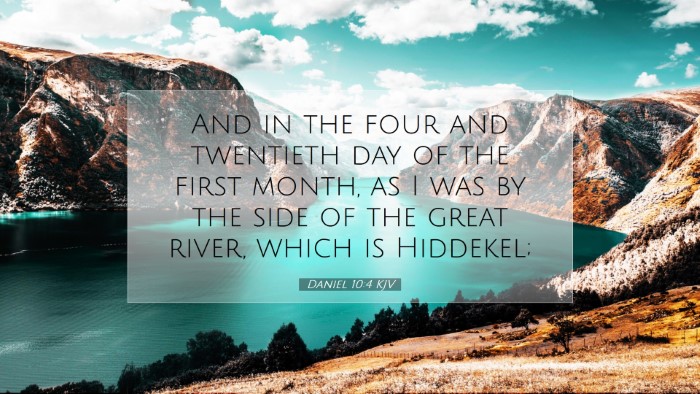Old Testament
Genesis Exodus Leviticus Numbers Deuteronomy Joshua Judges Ruth 1 Samuel 2 Samuel 1 Kings 2 Kings 1 Chronicles 2 Chronicles Ezra Nehemiah Esther Job Psalms Proverbs Ecclesiastes Song of Solomon Isaiah Jeremiah Lamentations Ezekiel Daniel Hosea Joel Amos Obadiah Jonah Micah Nahum Habakkuk Zephaniah Haggai Zechariah MalachiDaniel 10:4
Daniel 10:4 KJV
And in the four and twentieth day of the first month, as I was by the side of the great river, which is Hiddekel;
Daniel 10:4 Bible Commentary
Commentary on Daniel 10:4
Daniel 10:4 states:
"And in the four and twentieth day of the first month, as I was by the side of the great river, which is Hiddekel."
Contextual Background
This verse occurs in the context of Daniel’s intense prayer and fasting, which spans three weeks. It marks the beginning of a significant revelation from God to Daniel concerning the future of his people. The mention of the "great river" likely refers to the Tigris River, known in ancient times as Hiddekel, emphasizing the geographical setting of the vision that Daniel receives.
Insights from Matthew Henry
According to Matthew Henry, this chapter signifies a critical turning point for the Jewish nation during their Babylonian captivity. He emphasizes the importance of prayer and the persistence that characterizes Daniel’s approach to God. Henry notes that Daniel's grief and fasting precede a divine encounter, illustrating the relationship between earnest supplication and divine revelation.
- Significance of the Timing: The twenty-fourth day of the first month is particularly important as it coincides with the Passover season, reminding Israel of their redemption and serving as a backdrop for Daniel’s mourning and intercession.
- Location's Importance: The great river, Hiddekel, serves as a powerful symbol of life and sustenance, reflecting God’s provision even in a foreign land.
Insights from Albert Barnes
Albert Barnes provides an examination of the timeline and setting of this prophetic vision. He notes the significance of the river being a symbol of the flow of divine wisdom and knowledge. Barnes expands on the idea that the "great river" not only represents the physical location but also serves as a metaphor for the spiritual journey of seeking God amidst trials.
- Spiritual Journey: The river Hiddekel embodies the concept of God's dynamic guidance and the spiritual refreshment that comes from seeking His presence.
- Overview of the Vision: This chapter introduces the reader to the heavenly warfare that unfolds as a backdrop to Daniel’s prayer — a theme that resounds throughout the book, tying human affairs directly to divine actions.
Insights from Adam Clarke
Adam Clarke’s commentary highlights the emotional and spiritual state of Daniel during the events of this chapter. Clarke elaborates on the intensity of Daniel’s fasting, emphasizing the connection between physical deprivation and spiritual enlightenment. He also gives historical context regarding the timing of the passage and its implications for the prophetic revelations that follow.
- Physical and Spiritual Warfare: Clarke suggests that Daniel's physical affliction (emotional and perhaps health-related due to fasting) serves to amplify the spiritual battles being fought in the heavenly realm.
- Impact of Context: Understanding the historical context of the Israelites' exile deepens the impact of Daniel's plea for mercy and revelation from God.
Theological Reflections
The verse invites readers to reflect upon the intersection of divine sovereignty and human agency in prayer. Daniel’s posture of humility, paired with his desperate yearning for understanding, illustrates a profound relationship with God that serves as a model for believers.
- Intercessory Prayer: Daniel’s example underscores the power of intercessory prayer, especially in times of national crisis. His entreaty signifies a collective plea for restoration.
- God’s Revelation: Much like Daniel, contemporary believers are reminded of the necessity of persistence in prayer, trusting that God listens and responds to the heart of His people.
- Spiritual Warfare: This passage encourages reflection on the unseen battles that affect the lives of believers and the importance of prayer as a means of engaging in these struggles.
Practical Applications
For pastors, students, and scholars, Daniel 10:4 serves as a reminder to cultivate a life of prayer and devotion. The insights from various commentaries can enrich preaching, teaching, and personal study.
- Encouragement in Fasting: Drawing from Daniel’s commitment to fasting, believers are encouraged to incorporate spiritual disciplines as a means of drawing closer to God.
- Awareness of Divine Timing: Recognizing that God’s timing may not align with human expectations encourages patience and faith in His plan.
- Hope Amidst Trials: Just as Daniel sought understanding during a tumultuous time, believers can find solace in prayer during personal or communal crises.
Conclusion
Daniel 10:4 stands as a powerful testament to the importance of prayer, the reality of spiritual warfare, and the need for divine revelation. Insights from notable commentators enhance our understanding of this passage, encouraging a deeper reflection on the nature of our relationship with God. As we engage with this text, let us be inspired to pursue God earnestly, recognizing His presence in our lives and the broader narrative of redemption.


